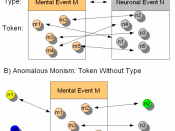This review of Davidson's theory of 'anomalous monism' serves to answer four main questions in consecutive order. Namely, what does Davidson mean in saying that the mental is anomalous? Why does he think that the mental is anomalous? What does Davidson mean by psycho-physical laws and finally; Why does he think that there are no psycho-physical laws? In answering these questions I shall give a full review of Davidson's theory a well as highlighting several of the main arguments against it.
According to Davidson, mental and physical events can be distinguished fairly simply. He declares that 'an event is mental if and only if it has a mental description or if there is a mental open sentence true of that event alone'. (a simple example of this is the statement that 'He imagines.') Davidson describes physical events as 'those picked out by descriptions or open sentences that contain only the physical vocabulary essentially'.
Of the several philosophical theories concerning the nature of the mind, Davidson has spawned the one declaring the mental to be 'anomalous'. In order to explain exactly what Davidson means by this term, it is necessary to give a global description of his account of the mental and subsequently zone in on the theory of the mental being anomalous.
Davidson proposes and defends this theory in his article and does so in order to remove an "apparent contradiction" that seems to follow from three principles he holds to be true about mental events. These are firstly, that there are causal connections between 'at least some' mental events and physical events. He explains this proposition with the example of 'the sinking of the Bismarck'. This example is relevant because, according to Davidson, there were various mental events such as 'perceivings, notings, calculations, judgements, decisions,


